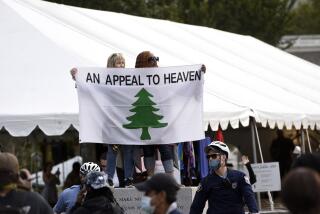Supreme Court sides with churchgoers who picketed military funeral
- Share via
Reporting from Washington — Ruling in a case that pressed the outer limits of free speech, the Supreme Court on Wednesday said that even anti-gay protesters who picketed the funerals of U.S. troops with signs reading, “Thank God for Dead Soldiers,” cannot be sued.
In an 8-1 decision, the justices upheld an appellate court’s decision to strike down a jury verdict against Fred Phelps and the Westboro Baptist Church of Topeka, Kan. Phelps and his family gained national attention — and stirred deep anger — for using military funerals as a backdrop to proclaim an anti-gay and anti-military message.
The church believes that the United States is too tolerant of sin and that the death of American soldiers is God’s punishment.
Chief Justice John G. Roberts Jr. said that when the disputed words “address matters of public import on public property” and when the protest is conducted “in a peaceful manner, in full compliance with the guidance of local officials,” they are protected.
Roberts cited past rulings that shielded offensive words and outrageous protests.
He pointed to the decision that freed protesters who burned the American flag and another that protected a Hustler magazine satirist who portrayed the Rev. Jerry Falwell in an outhouse. Last year, Roberts spoke for the court in striking down on free-speech grounds a law that made it crime to sell videos of illegal dog-fighting.
The “bedrock principle underlying the 1st Amendment,” Roberts said in quoting the flag-burning ruling by the late liberal Justice William J. Brennan Jr., is that the government cannot punish words or ideas “simply because society finds the idea itself offensive or disagreeable.”
The decision Wednesday drew a howl of protest from Justice Samuel A. Alito Jr. — like Roberts, a conservative — who said that the father of the dead Marine who sued the protesters was “not a public figure” who could be expected to tolerate such an onslaught, but a private person who sought to “bury his son in peace.”
“Our profound national commitment to free and open debate is not a license for the vicious verbal assault that occurred in this case,” Alito wrote. “In order to have a society in which public issues can be openly and vigorously debated, it is not necessary to allow the brutalization of innocent victims.”
Five years ago, Phelps and his daughters were sued after they picketed near the funeral for Marine Lance Cpl. Matthew Snyder, who died in Iraq in 2006.
Police had kept picketers at least 200 feet from the funeral procession. The demonstrators’ signs included one that said, “Thank God for IEDs,” a reference to the roadside bombs that have claimed many soldiers’ lives in Iraq.
The messages did not refer to the late Marine. His father, Albert Snyder, testified that he saw the signs only when he watched television coverage in the evening.
A few weeks later, however, Snyder saw a posting on Westboro church’s website that scorned him and said he had raised his son to serve the devil.
A jury awarded Snyder $11 million in damages for the emotional distress he suffered, but a judge reduced the amount to $5 million. A U.S. appeals court, siding with the Phelps family, said the verdict could not stand.
The Supreme Court took up the case of Snyder vs. Phelps. The issue was difficult for the justices because the public picketing targeted a private family funeral.
If the picketing had taken place at the Pentagon or Capitol Hill, no one would have questioned the Phelps’ right to carry their signs, even with their offensive messages.
Lawyers for the father argued that the verdict should stand because he was a private figure, not a public person, and because the protest was a targeted assault on a private memorial service.
In the end, the justices concluded the picketing was more a public protest than a mean-spirited private assault.
The picketing, Roberts wrote, “is certainly hurtful and its contribution to public discourse may be negligible. But Westboro addressed matters of public import on public property, in a peaceful manner.”
“On the facts before us, we cannot react to that pain by punishing the speaker,” Roberts wrote. “As a nation we have chosen a different course — to protect even hurtful speech on public issues to ensure that we do not stifle public debate.”
The decision does not appear to affect the laws in 43 states that seek to keep the protesters away from military funerals. In the past, the court has said that officials may regulate where marches and protests take place, so long as they do not ban them or their message entirely.
The Veterans of Foreign Wars said they were “greatly disappointed with the result.”
“The Westboro Baptist Church may think they have won, but the VFW will continue to support community efforts to ensure no one hears their voice,” said Richard Eubank, the VFW’s national commander.
More to Read
Sign up for Essential California
The most important California stories and recommendations in your inbox every morning.
You may occasionally receive promotional content from the Los Angeles Times.











